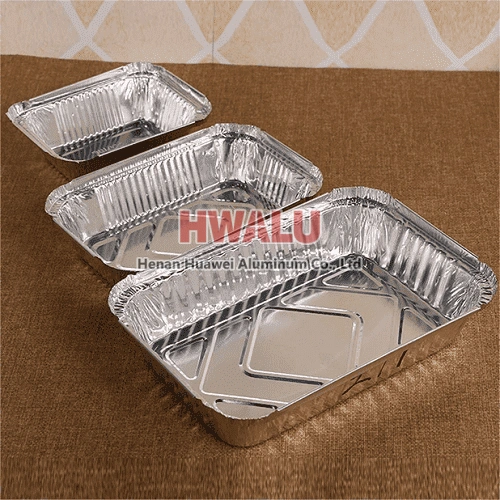What is an aluminum foil pan? A foil pan is a cooking vessel made of aluminum foil. Since aluminum foil has good thermal conductivity and corrosion resistance, these aluminum foil pans are commonly used for baking, roasting and storing food. Aluminum foil pans can be easily used for a variety of purposes due to their lightweight, thermally conductive properties and the fact that they can be discarded after use. ...
What is extra wide aluminum foil "Extra-wide aluminum foil" refers to aluminum foil that is wider than commonly used standard widths. Aluminum foil is a thin sheet of metal used for a variety of purposes, including packaging food, covering cooking dishes, and as a heat-resistant barrier. Extra wide aluminum foil thickness The standard width of household aluminum foil is usually about 12 inches (30 cm). Extra-w ...
What is aluminum foil for foil board Aluminum foil for foil board refers to a special type of aluminum foil used to make foil board, also known as "foil material". Foil sheets are commonly used to package food and pharmaceuticals to protect them from air, moisture, odours, light and other external elements. Aluminum foil for foil boards is usually thicker than regular aluminum foil, usually between 0.2-0.3 mm ...
Introduction: At Huawei Aluminum, we take pride in being a leading manufacturer and wholesaler of high-quality aluminum foil paper designed specifically for food containers. With a commitment to excellence and precision, our 3003 Aluminum foil is engineered to meet the highest industry standards, ensuring the safety and reliability of your food packaging. Why Choose 3003 Aluminum for Food Containers? The c ...
Pharmaceutical easy-tear aluminum strip foil Pharmaceutical easy-tear aluminum strip foil is a common pharmaceutical packaging material, usually used to package pharmaceuticals such as oral tablets and capsules. It has the advantages of easy tearing, good sealing, moisture resistance, and oxidation resistance, which can effectively protect the quality and safety of medicines. Pharmaceutical easy-tear aluminum ...
Six Factors Restricting the Heat Sealing Strength of Pharmaceutical Aluminum Foil Packaging Products
For aluminum foil pharmaceutical packaging, the quality of the product is largely reflected in the heat seal strength of the product. Therefore, several factors that affect the heat-sealing strength of aluminum foil bags for medicines have become the key to improving the quality of product packaging. 1. Raw and auxiliary materials The original aluminum foil is the carrier of the adhesive layer, and its qual ...
Food packaging aluminum foil is related to human health and safety, and is usually produced with specific specifications and characteristics to ensure its suitability for the food industry. The following are some common specifications of aluminum foil for food packaging: Food packaging foil alloy types: Aluminum foil used for food packaging is usually made from 1xxx, 3xxx or 8xxx series alloys. Common alloys in ...
The performance differences between 3003 aluminum foil and aluminum plate are primarily related to its physical and mechanical properties and its intended application. Here are some of the main differences in performance: Formability: 3003 Aluminum Foil: 3003 aluminum foil is highly formable and can be bent, formed and folded easily. It is often used in applications that require flexibility and ease of mold ...
Product name: plain aluminum foil SIZE (MM) ALLOY / TEMPER 0.1MM*1220MM*200M 8011 O
1. Insulation and fragrance preservation Aluminum foil lunch boxes are usually used as paper-wrapped beverage packaging. The thickness of the aluminum foil in the packaging bag is only 6.5 microns. This thin aluminum layer can be waterproof, preserve umami, anti-bacterial and anti-fouling. The characteristics of preservation of fragrance and freshness make the aluminum foil lunch box possess the properties of fo ...
The most commonly used aluminum foil alloy in food packaging applications is 8011. Aluminum alloy 8011 is a typical alloy of aluminum foil and has become the industry standard for food packaging due to its excellent properties. Here are some reasons why alloy 8011 is ideal for food packaging: Good Barrier Performance: The aluminum foil made of 8011 alloy can effectively block moisture, oxygen and light, helpin ...









